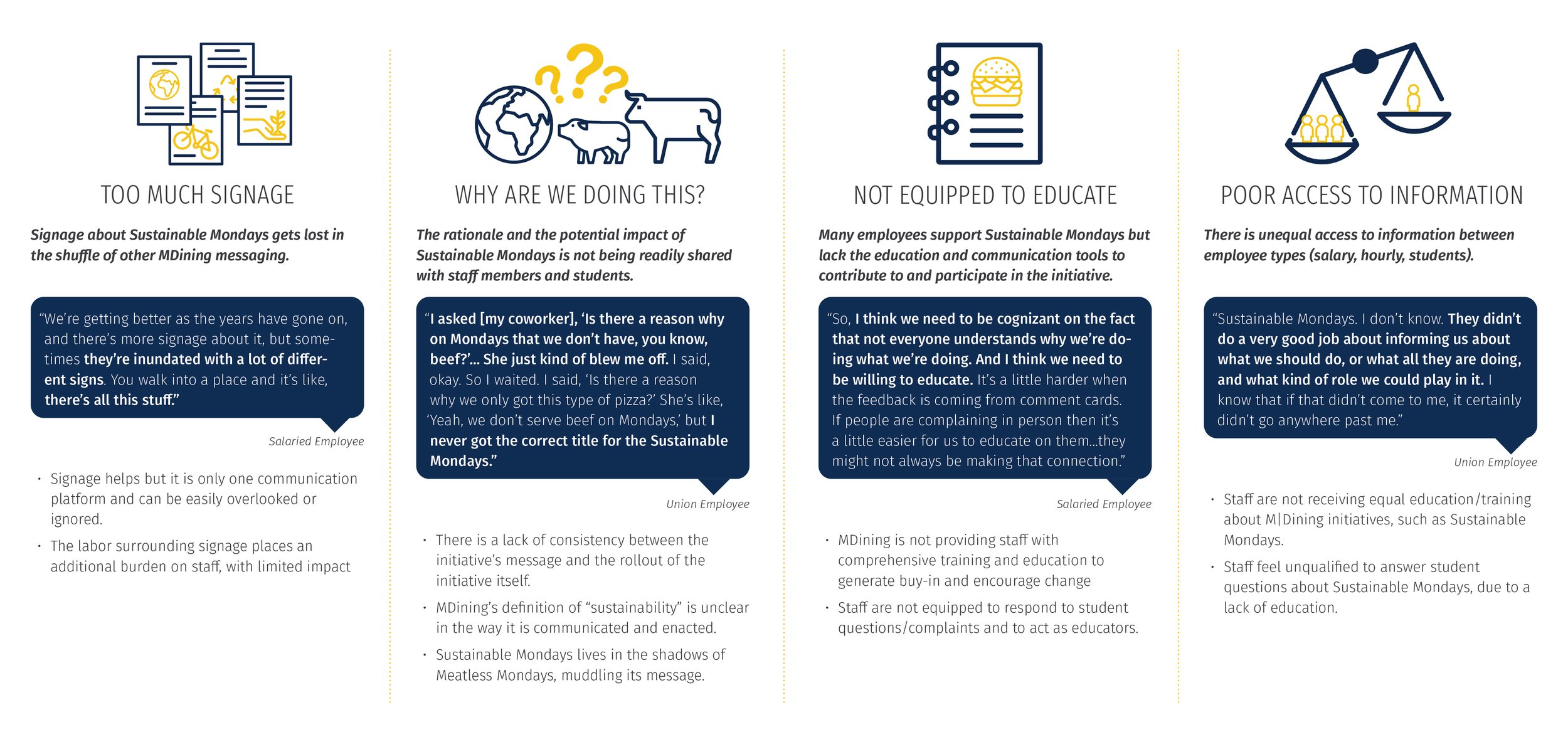
Sustainable Mondays

Sustainable Mondays Rollout | University of Michigan Dining
Multi-stakeholder behavior change is hard.
The objective of this research project was to identify unmet needs and pain points of University of Michigan Dining (MDining) staff in the rollout of Sustainable Mondays. Inspired by the Meatless Mondays movement, Sustainable Mondays is a weekly initiative that removes red meat (beef, lamb, and pork) from all University of Michigan dining hall menus, emphasizes plant-forward options, and educates students on food sustainability in the dining system and beyond. The rollout of this program was more welcomed by students compared to a prior pilot where all meat was removed, yet there was still some confusion among students and dining hall staff. My six-person MDes graduate cohort, whose disciplines span from inside and outside of design, quickly melded to plan and execute a series of stakeholder interviews, analyze the qualitative data, and formulate five categories of recommendations to move this program forward.
Methods
22 participants (managers, chefs, servers, union staff, student staff) across 7 dining halls
30-45 min semi-structured interview sessions (1 staff member interviewed by 2 MDes students)
Part A of the interview: Uncover MDining culture and understand the needs of staff in a general sense
Part B of the interview: Learn about staff experiences and their understanding of Sustainable Mondays
A brief staff questionnaire to collect demographic data and quantify staff perception of MDining’s working culture
Focusing on Staff Education + Involvement
Based on initial conversations with the MDining Director of Student Engagement, the Executive Chef, and the Assistant Program Manager, our team developed three project briefs to explore opportunities to improve this initiative, such as investigating initiative messaging that resonates with students and developing ways to integrate greenhouse gas reduction strategies into chefs’ menu planning process. We quickly coalesced around how dining hall staff understand and participate in Sustainable Mondays, as they are the key to implementing MDining’s sustainability goals. After selecting this direction, my cohort and I developed a research protocol and materials to support our inquiry, which can be viewed here.
Visualizing a Communication Ecosystem
After collaboratively coding and analyzing our interview data, I created a stakeholder diagram to illustrate the flow of communication in the rollout of the Sustainable Mondays program. Yellow circles indicate pain points in the system.
Drawing out Broader Themes
From the communication ecosystem, the cohort and I articulated four themes that encapsulate the challenges MDining was facing in the implementation of Sustainable Mondays.

Recommendations
As a cohort, we outlined five opportunities where MDining could strengthen Sustainable Mondays and other sustainability initiatives. In this process, we considered cost-effectiveness, impacts on management and staff, feasibility, and the maintenance of any changes in operations.

1. Conduct a sustainability-focused visioning workshop with upper management.
Help clarify MDining’s goals for sustainability, carbon neutrality, and the future of university dining.
Support alignment of the organization’s cultural values around sustainability.

2. Conduct a co-creation workshop leveraging staff perspectives and ideas.
Provide an opportunity for staff to participate in Sustainable Mondays and create ways for staff involvement in future initiatives.
Leverage the knowledge of staff to help tailor initiatives to the needs of each dining hall.
Support grassroots sustainability initiatives that come from hourly staff as well as students.

3. Enhance Sustainable Mondays materials to be accessible and actionable to all.
As one of the main opportunities for formal training about Sustainable Mondays, the guidebook should be distributed to all staff and be included in onboarding materials.
Use the week-by-week breakdown in the Sustainable Mondays guidebook to provide clear talking points for dining hall managers to share with their staff during huddles.
Update the guidebook to provide a clear definition of sustainability at MDining and why red meat is being removed from menus.

4. Develop participatory training for Sustainable Mondays.
Ensure all staff have the knowledge to understand and share MDining’s sustainability goals with students.
Inspire staff to actively integrate sustainability in their roles in MDining.
Help staff understand the complexities of carbon emissions associated with food so that they can serve as educators for students.

5. Leverage student ambassadors to support the Sustainable Mondays mission.
Utilize Planet Blue Student Ambassadors (a U-M sustainability initiative) and/or MDining student employees to assist in sustainability initiatives as ambassadors.
Giving students an opportunity to pursue their passion for sustainability in MDining may help with student staffing concerns while providing a resume builder.
Student Ambassadors can ensure that red meat is not being served, that signage is being utilized to the fullest, and be available to answer questions and support staff.

So, What Happened Next? Welp, COVID-19.
This project wrapped up just weeks prior to the COVID-19 global pandemic. While these findings and recommendations were useful to MDining, the department had to rapidly shift to take-out dining and ensure that they are providing some sense of normalcy for student customers in this unprecedented time. However, MDining continues to be committed to reducing their greenhouse gas emissions and testing new strategies to shift consumption behavior.
